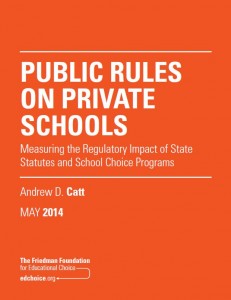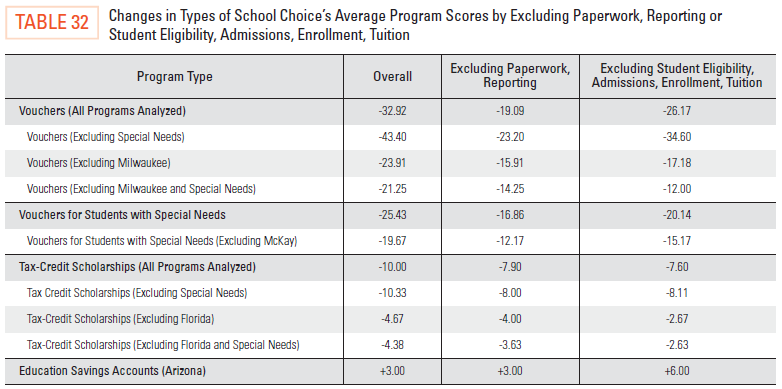 As Florida lawmakers voted this year to strengthen a scholarship for low-income students, critics took repeated aim at issues of accountability, arguing the students don’t take standardized tests and the schools are “unaccountable” and “unregulated.” But a new national report, “Public Rules on Private Schools,” by Andrew Catt of the Friedman Foundation, demonstrates that such claims are exaggerated.
As Florida lawmakers voted this year to strengthen a scholarship for low-income students, critics took repeated aim at issues of accountability, arguing the students don’t take standardized tests and the schools are “unaccountable” and “unregulated.” But a new national report, “Public Rules on Private Schools,” by Andrew Catt of the Friedman Foundation, demonstrates that such claims are exaggerated.
Friedman, a free-market education think tank, actually ranks the Florida tax credit scholarship as the most regulated state scholarship law in the nation. Participating private schools in Florida are required to administer standardized tests and, as far as accountability to the public goes, face twice as many reporting requirements as non-participating private schools. Friedman also ranked the Florida scholarship as third most regulated among all 23 state voucher and tax credit scholarship programs combined.
Catt analyzed private school regulations before and after the passage of 23 private school choice programs from around the nation. Each regulatory statute is weighted -3 to +3 and assigned to one of nine categories such as, “paperwork, reporting,” “testing, accountability,” and “curriculum, instruction.” Negative scores represented regulatory requirements/burdens while positive scores represented protections for schools such as funding parity or regulatory cost reimbursements. The further the score is from zero, the bigger the impact.
“Paperwork, reporting” turns out to have the largest impact on school choice program scores, owing to the sheer number of state statutes requiring private schools to report information to the state. This does not mean reporting regulations are a bigger burden than something like uniform testing and curriculum requirements.
States across the nation already imposed regulations on private schools, such as health and safety requirements, before passing school choice programs into law. The amount of pre-school choice regulations varies from state to state. Once a school choice program passes into law, most states impose additional new regulatory burdens for private schools that wish to participate.
The new school choice regulations varied considerably depending on the type of program. Private schools participating in voucher programs saw far more new regulations than private schools participating in tax credit scholarship programs. Private schools participating in Arizona’s education savings accounts saw the least. This mirrors the findings of Andrew Coulson’s 2010 Cato Institute report.
Both of Florida’s private school choice programs, McKay scholarships and the tax credit program, created a large new regulatory burden for participating schools. In fact, McKay (-60) and the tax credit program (-58) ranked 2nd and 3rd respectively for the largest new regulatory impact on participating schools.
As it turns out, the tax credit program is a major outlier among similar programs. Its impact score is 12x larger than the average score for all other tax credit scholarship programs. Catt attributes this score (and McKay’s large score) to politicians’ “overreacting” to scandals involving scholarship funding organizations and private schools early in the program’s history. Indeed, early on in the program’s history it may have been far too easy to start a private school or a SFO, and that may have enabled bad actors to participate.
Other states see few new regulatory impacts and some already heavily regulate private schools. For example, Indiana requires participating private schools to be accredited and those requirements mean private schools face virtually the same regulations as public schools. As a result, have a regulatory score of -116 before entering the voucher program. Participating in the voucher program adds just -5 points, for a total impact score of -121. (It is worth nothing that even though Indiana private schools regulated in functionally the same way as public schools, critics still oppose school choice because the critic’s real complaint is, and always will be, about the money).
By comparison, Florida’s private schools see total impact scores of -77 and -72 (old regulations + new choice regulations) for McKay and the tax credit program respectively. This still places Florida’s programs 4th and 5th for highest regulatory impact on private schools among the 23 programs examined.
Regulations on participating McKay private schools doubled in five categories: “Certification/Licensure,” “Application/School Eligibility,” “Paperwork/Reporting,” “Student Life, Health and Safety” and “Student Eligibility and Admissions, Enrollment, Tuition.”
Private schools participating in the tax credit program saw regulations double in seven categories, including brand new requirements for financial reporting and testing. Only “curriculum/instruction” and “transportation” regulations remained unchanged.
Whether you agree with the Friedman Foundation that Florida’s participating private schools might be over-regulated, it is clear critics overstated their claims when they claimed the schools were “unregulated.”
Full disclosure: Step Up For Students, a co-host for this blog, administers the Florida tax credit scholarship program. Patrick Gibbons, the author of this post, is also a research fellow with the Friedman Foundation.



